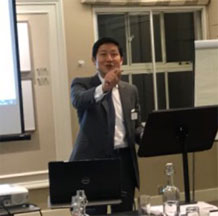Dr Joseph Lee convened an international workshop on AI in financial services.
Dr Lee held a workshop titled ‘AI in Financial Markets: Innovation, Law, and New Ecosystems’. This is part of Dr Lee’s third project on the theme of law and financial innovation after the Stock Exchange Interconnection project in 2016 and the Distributed Ledger Technologies in Capital Markets project in 2017.
The aims of the workshop are to understand the mechanics of AI (transparency of algorithms) and how it may be used to improve (or reduce) quality of services, productivity and negative externalities across the financial services industry; to understand how AI can be used in finance to maintain market stability and integrity, increase access to capital, and provide integrated services; and to define the role, function and risk of AI in a liberal democratic society, including by examining to what extent AI can enhance democratic participation in financial markets and whether it will result in disruptive innovation.
Prof David Donald of the Chinese University of Hong Kong (CUHK) delivered a keynote speech on Agency of Autonomous Systems for Law, measuring autonomous agents running on computer software or distributed ledgers against the rule of law. Dr Lee acted as a commentator on his paper and discussed the limitations of ‘Code as law’ and the possible impact on new technologies on individual freedom and liberal society. Prof Jan Lieder, Fribourg University, Germany, Prof Antonios Karaiskos, Kyoto University, Japan, Prof Catherine Pedamon, University of Westminster, London, and Prof Alex Yang, Taiwan University, delivered papers on themes including financial inclusion, AI directorship, robo-advisers, and the impact of the GDPR on RegTech development. Prof Albert Chou and Ms Peichen Hsu, Taiwan Stock Exchange, Mr Graham Biggart, IBM, Mr Alex Waite, Lane Clark & Peacock, Ms Siobhan Cleary, World Federation of Exchanges, Dr Paolo Siciliani, Bank of England, and Mr Jack Oliver, Exeter University’s Impact, Innovation, and Business, participated as non-academic partners, providing industry and regulatory evidence and feedback. Two PhD researchers, Mr Thomas Sisk and Mr Harry Jayakrishnan, also gave papers on the uses of AI by sell-side in securities trade and the uses of AI for anti-money laundering control.
The findings of this workshop have mapped out the stakeholders and their relationships in the new AI community: data subjects, data-holders, and AI developers. The workshop has also identified the potential new form of governance that can increase democratic participation and maintain trust addressing issues such as, fairness, safety, social inclusion, algorithmic transparency, and the impact of AI on fundamental rights (privacy, dignity, consumer protection, and non-discrimination). Furthermore, this project has defined the parameters for good data capability (collection, retention, curation, analysis, protection) of AI.
Dr Lee will continue collaborating with these partners in researching the mode for public acceptance of the use of AI in financial services, developing sectoral and cross-sectoral guidance for data ethics to improve data trust, and building up an operational model to remove legal barriers to scaling-up AI.

